Iran's Prosecutor Says Hijab Is Mandatory For All
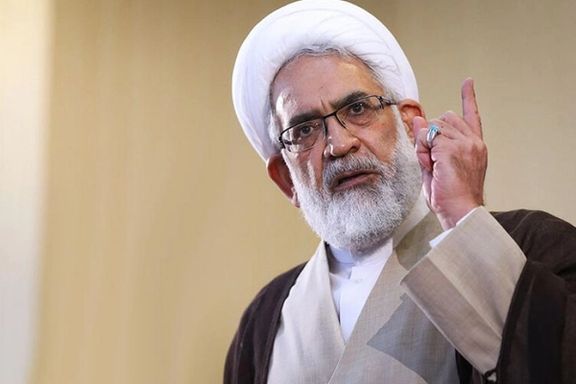
Iran's prosecutor-general has reiterated the compulsory nature of the hijab, declaring it a legal and religious obligation for everyone in the country, including non-Muslims.

Iran's prosecutor-general has reiterated the compulsory nature of the hijab, declaring it a legal and religious obligation for everyone in the country, including non-Muslims.
Mohammad Jafar Montazeri added that adherence to the hijab is mandatory for all citizens, reflecting the Islamic regime's stance on enforcing hijab irrespective of individual beliefs.
"Hijab is not merely a religious and cultural symbol but a firmly established legal requirement. All residents, regardless of their religious convictions, must comply with the law as it applies generally within our borders."
His statement comes amidst escalating enforcement in the streets under Project Nour, the government's aggressive campaign to ensure compliance with hijab. The initiative has seen a notable increase in confrontations between government agents and the public, particularly targeting women perceived as non-compliant with the mandatory dress code.
The renewed enforcement push has sparked widespread criticism both domestically and internationally, highlighting concerns over human rights abuses. Reports from Tehran indicate a sharp rise in incidents where law enforcement has extorted money, committed theft, and engaged in harassment under the guise of hijab law enforcement.
International human rights groups, local activists, and numerous citizens have voiced alarm over the measures, denouncing the oppressive tactics employed by the authorities.
Recently, Tehran hosted a rally aimed at protesting against hijab defiance. Despite widespread advertising, these rallies failed to attract significant participation.
Since the death of Mahsa Amini in September 2022, detained by morality police for improper hijab, an increasing number of women have publicly forsaken the hijab, sparking widespread protests across the nation against the Islamic Republic.
Authorities have consistently issued warnings to women to adhere to hijab, threatening penalties for non-compliance. Numerous women have been arrested or summoned, and several businesses have been closed for not enforcing hijab regulations.

Fifteen former Iran hostages have censured the Swedish government for “lack of meaningful action” to free Swedish-Iranian doctor Ahmadreza Djalali, who has been on death row in Iran for more than 6 years.
“Sweden has done little to secure his release and also inexcusably failed to provide his family with the level of support and information they need and deserve,” the signatories write in a letter dated 25 April, the eve of Djalali’s eighth year in prison.
Djalali was arrested in April 2016, visiting Iran on an academic trip at the invitation of the University of Tehran and Shiraz University. He was charged with espionage and collaboration with Israel two weeks after his arrest –a charge leveled at many, often with little or no real evidence. In October 2017, he was sentenced to death.
“As former hostages who endured the harrowing ordeal of prolonged unlawful detention in Iran,” the letter reads, “we write to express our deep concern over the ongoing lack of meaningful action taken by your government to secure the release of Ahmadreza Djalali, a Swedish physician on death row in the notorious Evin Prison.”
The signatories include Barry Rosen, who was taken hostage in Iran in 1979, when young supporters of Ayatollah Ruhollah Khomeini stormed the US embassy in Tehran, and Nazanin Zaghari-Ratcliffe, who spent six years in arbitrary detention in Iran, before reuniting with his family in the UK in 2022. Also on the signatories list is Siamak Namazi, Morad Tahbaz and Emad Sharghi, three of five US citizens released in 2023, as part of a deal brokered by the Biden administration, in which the US released 5 Iranian prisoners and paid $6 billion to the Iranian government.
That deal was heavily criticized at the time, and even more so after October 7th, when critics blamed the Biden administration for replenishing Iran’s coffers shortly before Hamas, sponsored by the regime in Tehran, attacked Israel.
“There is also an obligation incumbent on all of us to upend the vicious but prospering enterprise of hostage-taking by rogue states,” former Iran hostages write to the Swedish prime minister. “We ask that your government join forces with other countries whose citizens are being arbitrarily detained by the Islamic Republic and its ilk, and to attack the problem at its root. We must collectively devise and enforce draconian penalties that would deter this inhumane practice from happening in the first place.”
Taking hostages under false judicial pretexts has become normal practice in the Islamic Republic of Iran. Foreign and dual-national travelers are detained and used as bargaining chips by the government in dealing with western governments.
Many human rights activists are concerned that Dr Djalali could be used by authorities in Iran to secure the release –and return– of Hamid Nouri, a key figure in mass execution of Iranian political prisoners in 1988. He was a former Islamic official who was arrested in Stockholm airport in 2019 and sentenced to life in prison in 2023, after a long trial in which many former Iranian prisoners now in exile testified.
“It would be a tragedy of unacceptable proportions if Dr. Djalali—or any of your arbitrarily detained citizens—is excluded in any future prisoner deals,” former Iran hostages conclude their letter. “Sweden has a clear duty to secure the safe return of all its innocent citizens that Tehran is using as pawns in its wicked game of hostage diplomacy.”
The signatories and the years they spent as hostages in Iran are as follows:
Barry Rosen (1979- 1981), Jason Rezaian (2014 - 2016), Nizar Zakka (2015- 2019), Siamak Namazi (2015 - 2023), Mohammad Baquer Namazi (2016- 2022), Xiyue Wang (2016- 2019), Kamran Ghaderi (2016- 2023), Nazanin Zaghari-Ratcliffe (2016- 2022), Anoosheh Ashouri (2017- 2022), Kylie Moore-Gilbert (2018- 2020), Morad Tahbaz (2018- 2023), Emad Sharghi (2018- 2023), Benjamin Briere(2020- 2023), Fariba Adelkhah (2019- 2023), Roland Marchal (2019- 2020)
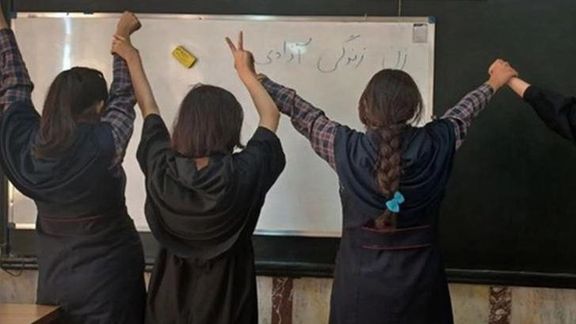
Iran's Deputy Minister of Education announced on Thursday that 16 chastity and hijab plans are to be implemented at schools.
“In 600,000 girls' schools, we must fulfill the task of promulgating Iran's progress and the Iranian girl's progress,” he said, without explaining what he means by ‘progress.’
Highlighting students' role in recent protests, he claimed that their participation is a result of a lack of space at schools to “exhaust students' pent-up energy.”
In December, he said that the enforcement of hijab among students should go “beyond school uniform rules,” suggesting that schools should have stricter dress code regulations.
His recent remarks are made at a time when the pressure on women to enforce hijab restrictions has dramatically increased. The Iranian government announced on April 13 that the morality police have been reactivated as part of a new initiative called 'Nour,’ aimed at curbing "immodesty."
Since then, social media has been flooded with videos demonstrating the widespread presence of the morality police and their violent crackdown on hijab rebels, prompting a massive backlash from women's rights activists, political commentators, and journalists.
Following the death of Mahsa Amini, 22, in the custody of the morality police in 2022, a significant number of morality police disappeared from the streets.
The renewed enforcement effort follows a directive from the Supreme Leader Ali Khamenei, who has consistently emphasized the need to adhere to "religious decrees" regarding the hijab, describing non-compliance as "religious norm-breaking."
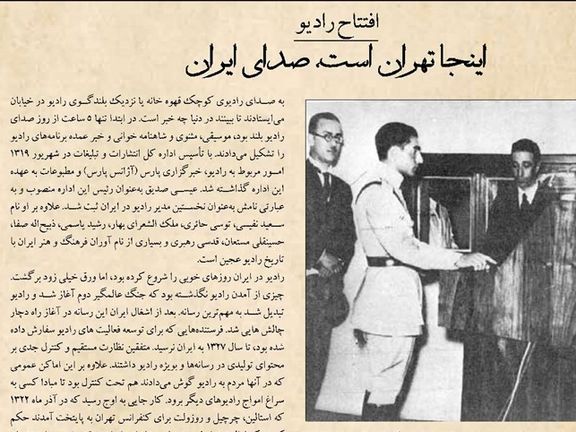
Radio Iran, the state-run radio turned 85 on April 23. Once a driving force of Iran's modernization, the broadcaster transformed into an Islamic propaganda tool following the 1979 revolution.
When the 'national radio' was introduced in Iran in 1939, there was an abundance of print media in the country. However, nearly 80 percent of the population was illiterate and unable to engage with the politically diverse media landscape. Radio emerged as a platform accessible to all, providing a means for engaging with the nation.
For four decades, Radio Iran served as a platform for the monarchy, promoting Shah Mohammad Reza Pahlavi's "positive nationalism" rhetoric. It also aided the country's technocrats in advancing a robust development plan, supported by the 1949 US-sponsored Point Four plan. This initiative, hailed by Washington as "a bold new program," aimed to leverage US scientific and industrial advancements for the growth and development of underdeveloped regions.
Radio Iran started its programming with news and entertainment for a few hours a day with the national hymn being broadcast at the beginning and end of daily programs. The hymn's starting lyric "Long live the Sha!" was indicative of the radio's political slant although leftist intellectuals and non-militant Islamists had their own share of the radio's limited airtime.
Radio Iran's biggest contribution to Iran's development, particularly in the 1950s, and 1960s was its advocacy of elements of progress including literacy, industrial and agricultural modernization, family planning and public education about concepts such as women's liberty and emancipation. The radio also advocated liberal ideas about political participation and the rights of workers and farmers.
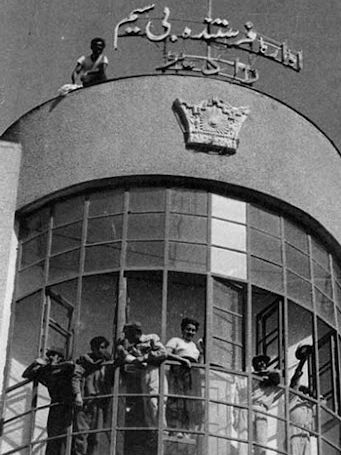
During the 1950s and 1960s, as Radio Iran expanded to 24/7 programming, it embraced the ideals of the United Nations for a better future for humanity. One notable program, "Let's Make the World a Better Place for All," exemplified this vision. The radio aimed to connect Iranians with the global community, emphasizing their role in a rapidly progressing world. Live broadcasts of events like the Olympics and milestones such as satellite launches underscored this effort to keep Iranians abreast of global developments.
Meanwhile, without succumbing to the influence of Muslim extremists, the radio aired religious programs during the Islamic holy months of Muharram and Ramadan, spotlighting key Shiite religious events. Additionally, a prominent cleric, Hossein Ali Rashed, hosted a highly popular hour-long primetime program every Thursday, attracting millions of listeners across Iran.
Perhaps more significant than all other programs from the 1950s to the late 1970s, was a three-hour long daily women's program every morning from 8:30 to 11:30, which offered more than cooking, public health and home economics points. The program "Woman and Life" hosted by renowned female celebrities such as Moloud Atefi, Forouzandeh Arbabi and Sorour Mahneshan played a key part in introducing the idea of women's equality with men. The idea was conveyed so delicately that it faced no objection from the traditional segments of the population.
At night, the radio showcased Iran's finest classical and pop music, along with the latest hits from the US and Europe. Afternoon hosts engaged listeners with discussions over tea. A program titled "Of Everything, Everywhere, Everybody" provided practical public knowledge interspersed with popular songs.
The news programs, while consistently beginning with coverage of the Shah, remained relatively impartial and politically balanced, free from ideological bias. Current affairs segments permitted moderate criticism of the system's deficiencies. Additionally, content from Tehran's outspoken press was incorporated into radio broadcasts without fear of reprisal for broadcasters, writers, or presenters. It was a regulated media landscape, characterized by limited control rather than totalitarianism, allowing for certain civil and social liberties.
The 1979 Islamic revolution wrought profound changes in Iran, including a radical transformation of the national radio. Overnight, women singers vanished from the airwaves, replaced by mournful songs depicting early Islamic tragedies. Female presenters became scarce, smiles were banned on TV, and radio content rendered women nearly invisible. Yet, this state of affairs was unsustainable.
It wasn't until nearly a decade later that women began to reappear in news and children's programs. In the late 1980s and early 1990s, a brief window for criticism opened in the morning program "Hello, Good Morning," but dissent was swiftly stifled as the regime grew intolerant.
Since 1979, Radio Iran has remained deeply ideological, adhering strictly to the government's official narrative, even in accounts of Islamic history. The station's disregard for public taste has alienated listeners, with many turning to foreign-based media for news. State broadcaster research acknowledges declining viewership for state TV but remains silent on the radio's fate.
Listeners are not to blame for Radio Iran's decline, as repetitive ideological propaganda fails to engage or inform. Recent TV programs have featured celebrities confessing to favoring old songs over state radio broadcasts. Despite this, podcasts have emerged as a vibrant alternative, offering diverse content free from censorship. One such podcast, "Radio Nist" ("It's Not Radio"), explores Iran's radio history, including an episode titled "Radio Ark," named after Tehran's Ark Square, home to Radio Iran's former studios.
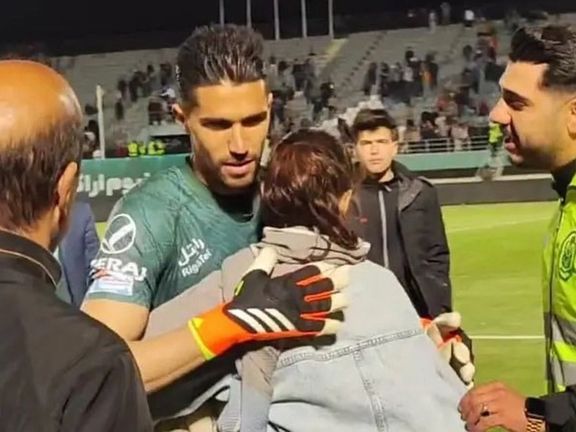
The news of Esteghlal FC's captain Hossein Hosseini's suspension and fine for hugging a female fan has been slammed worldwide with coverage in countries including the UK, Spain, Kenya, and China.
The incident occurred on April 12 when a female fan attempted to avoid arrest for not wearing the hijab by running on the pitch and hugging Hosseini. A fine of three billion Iranian rials (roughly $4,500) was imposed on the player, along with a one-game suspension from the team. Ole, the Argentinian sports news website, called the incident a “scandal.”
Hosseini stated that he would pay the fine, asserting that "three billion rials for the sake of a female fan of Esteghlal is well worth it" which infuriated officials.
In response, the IRGC-affiliated Fars News Agency launched a campaign demanding further actions against Hosseini, resulting in an additional 300 million rial ($7,000) fine on Monday.
It is not the first time the woman in question, Sahar Khodayari, has garnered international media attention. In September 2019, she set herself on fire after being sentenced to six months in prison for attempting to enter a stadium disguised as a male supporter during a match between Esteghlal and Al Ain.
Hoseeini's case has revived debate over women's access to stadiums in Iran, a contentious issue that has attracted international attention and criticism.
Although FIFA continues to push for women's inclusion in football stadiums, governmental opposition citing inadequate infrastructure continues to limit their presence, resulting in sporadic admissions under strict rules.
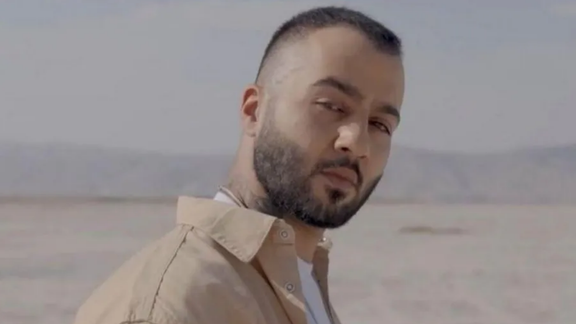
A metalworker in Isfahan, central Iran, Toomaj Salehi has become a face of Iran's uprising, a rapper whose lyrics oppose repression, injustice, and poverty.
On death row, his fearless dissent has seen the young artist sentenced to death in Iran's continuing flurry of executions in the wake of the 2022 Woman, Life, Freedom, movement, sparked by the death in morality police custody of Mahsa Amini for the alleged improper wearing of her headscarf.
One of Salehi's most famous political songs, "Buy a Rat Hole" in 2021, long before the death of the young Kurdish woman, addresses the corruption of Iranian authorities and the impunity of their actions. "You are a murderer if you cover up murder. To cover up murder, you must step in blood," he sang, his words even more poignant after state security forces murdered more than 500 Iranians in the wake of September 2022's uprising.
According to political analysts such as Majid Mohammadi, Toomaj's songs represent “the sentiments of a generation of young Iranians who ardently and persistently seek the regime's downfall", sentiments which rock the regime as it faces the harshest opposition since the establishment of the Islamic Republic in 1979.
He was first arrested in September 2021 when twelve intelligence ministry agents raided his home in Isfahan. Thousands of Iranians condemned his imprisonment on social media, and Amnesty International called for his immediate release in a statement released on September 17. Later that month, Salehi was released on bail.
During the height of the Woman, Life, Freedom protests on October 30, 2022, the intelligence ministry in Isfahan province violently arrested him again for his artistic activities in favor of the anti-government movement. While in custody, he was tortured severely and forced to make televised "confessions".
Toomaj was sentenced to 75 months in prison last July after the Iranian Supreme Court effectively ruled out the possibility of a death sentence. More than a year after being arrested, he was released on bail in November. Several days after his release, he fearlessly published a video message detailing the torture and mistreatment he had endured at the hands of regime intelligence agents. Almost immediately, he was re-arrested.
On Wednesday, an Iranian revolutionary court sentenced 33-year-old Salehi to death for charges linked to the 2022 nationwide protests, charges his lawyer claimed he was acquitted of earlier.
Salehi, dubbed the “world’s bravest rapper” by Western media, has a 20-day appeal period. His lawyer, Amir Raeisian, said they will challenge the ruling.
"I talked to Toomaj. He hopes to see the changes to this sentence in the legal process," Raeisian told Roydad24 in an interview on Thursday, adding that Salehi is “not worried.”
Salehi's case has touched the hearts of politicians around the world who have come out to condemn the death sentence amid soaring numbers of executions in Iran, over 800 last year alone.
Reacting to his sentence on Wednesday, US Department Deputy Spokesperson Vedant Patel said: “This is just another example of the Iranian regime's horrific and pervasive human rights abuses. We once again condemn the Iranian regime's use of the death sentence as a tool to suppress people's human rights and fundamental freedoms.”
Abram Paley, US Deputy Special Envoy for Iran, also wrote on X “We strongly condemn Toomaj Salehi’s death sentence and the five-year sentence for Kurdish-Iranian rapper Saman Yasin. We call for their immediate release.”
“These are the latest examples of the regime’s brutal abuse of its own citizens, disregard for human rights, and fear of the democratic change the Iranian people seek,” the US official added.
German MEP Max Lucks, advocate of sanctioning Iran Revolutionary Guard Corps (IRGC) in the EU, said Toomaj’s execution would be a “declaration of war on the young progressive voices in Iran,” he wrote on X. “The death sentence against him [Toomaj] shows the mullahs' contempt for the people of Iran.”
French Senator Nathalie Goulet wrote on X in French: "Toomaj Salehi has been sentenced to death. We must demonstrate to save his life."
“What kind of government kills its own children?” She tweeted in Farsi.
Gohar Eshghi, whose son Sattar Beheshti, a blogger, was killed under torture in prison in 2012, called “Toomaj the son of all Iranians” and condemned the "brutal sentence" against him.
Hamed Esmaeilion, an opposition activist in Canada, also said they will take to the streets over the weekend to support Salehi.
Large crowds rallied in European cities such as Frankfurt and Milan, on Wednesday and Thursday to call on their governments to halt the execution.
Social media platforms including X, have been trending with the hashtag #FreeToomaj, calling for his release. Videos circulating online show posters of him on the walls and highways inside Iran.